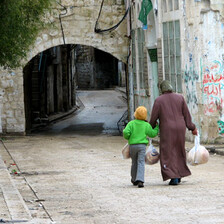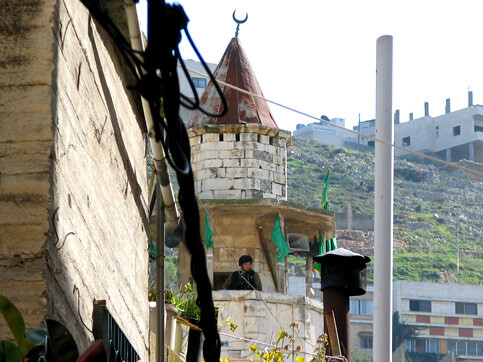
An Israeli soldier occupies the minaret of a mosque in the Old City of Nablus.
[… PREVIOUS]
7 March 2007
Most of the jeeps pulled out late Monday night, but we all knew they would be back. Israeli officials announced that the operation was not over, as they had not yet achieved their objectives. Typically, the army will withdraw for several hours or a whole day, hoping the wanted men will move around and be spotted by a collaborator working with Israel, and then the army can pounce. Soldiers also remained in occupied houses, where they typically set up hidden sniper nests.
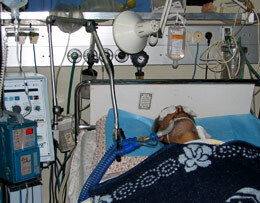
Ghareb Selhab lies unconscious at Al-Watani hospital
In the hospital we met family members of Ghareb Selhab, a man in critical condition since the day before. According to his son, Ghareb was in the bathroom when tear gas began to fill his home. He gasped to his wife that he could not breathe, and went into cardiac arrest. The family immediately called for help, but soldiers prevented the ambulance from reaching Ghareb’s home for over an hour. By that time Ghareb had stopped breathing and fallen into a deep coma. By the time he reached the hospital, he had no pulse, and it was too late. Doctors hooked him up to a breathing machine, and five days later (last Sunday) the family decided to pull the plug. He was 47 years old, the father of seven.
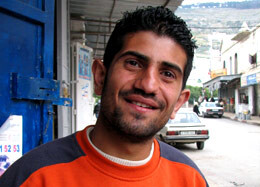
UPMRC volunteer, Alaa
Yara overheard someone being beaten next door. The raid was just one of many incidents of the army detaining medical relief workers. We interviewed our friend Alaa, who was detained while making rounds with a doctor on Monday. Alaa was handcuffed in a jeep for seven hours, scolded when his hands shook (he has a weak pulse condition), and hit anytime he raised his head. He was released five miles south of the city at midnight, but back delivering medicine with UPMRC on Wednesday after the soldiers reinvaded and curfew was imposed again.
The second invasion seemed heavier than the first, with even more soldiers and jeeps around every corner. More and more families were going incommunicado, which we understood to mean their homes were being occupied. Sometimes people would call for help, but when we arrived nobody would answer. Neighbors were sure that the families hadn’t left, so we would yell to the soldiers that we knew they were there and just wanted to deliver medicine. After some insisting sometimes they’d answer, sometimes not.
Once we were made to wait forty minutes outside one occupied home. As we waited, soldiers escorted detained men in and out, including one group of at least ten medical volunteers from the Red Crescent and UPMRC. After half an hour they let the medical relief workers go on the condition that seven would leave the area and the other three would stop doing distributing medicine.
Sometimes the detainment was unofficial. Soldiers demanded at gunpoint the IDs of the four volunteers we were accompanying, and then refused to give them back for a full hour. Because it’s extremely dangerous to be caught breaking curfew without an ID, we were forced to wait instead of delivering insulin to a diabetic who was waiting. The soldiers claimed they were checking the IDs, but spent the hour chatting, eating lunch, and taking pictures of us waiting.
There were so many stories that I stopped writing them down. But one that stuck with me came from Nova and Yara, who were delivering bread and medicine with three friends from UPMRC when soldiers called them from far away to approach their jeep. One by one, our friends were ordered to open their jackets, pull their pants down, turn around, and put their hands up against the wall. Nova and Yara averted their eyes with shame as the men were forced to strip in front of them. The soldiers let them go afterwards, but we have scarcely seen our friends since — I can only imagine their embarrassment, in a culture where modesty and gender boundaries are so important.
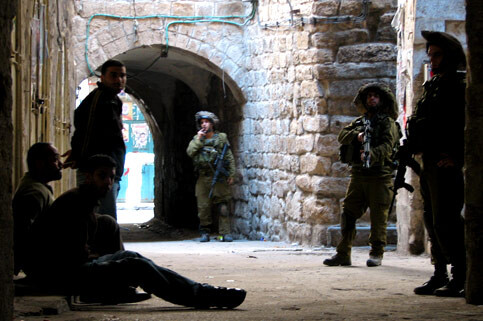
Palestinian men detained by Israeli soldiers.
Something about humiliation is worse that physical punishment. I’ve heard stories of young women detained, photographed naked, and threatened that if they don’t collaborate with the army (as spies), their pictures will be distributed, shaming them and their families beyond repair. This can be more effective that bribery and even torture. It’s interesting how many of the detainees are young people, sometimes not more than 13 years old, who say they aren’t questioned about the wanted men at all. Instead, soldiers use various techniques to encourage them to collaborate.
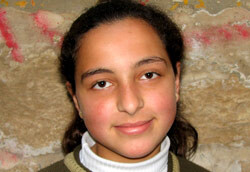
Jihan
Jihan was not the only young human shield used this week. One family told us how the soldiers invaded by breaking a hole through their wall, herding 27 family members into one room, and taking two kids to open doors in front of them as they raided the rest of the neighborhood. After six hours, the women and older men were released while the human shields and all other men were handcuffed and taken away. One of the men, Abdallah, gave us his testimony:
We were five in total, ages 17 to 30. They led us away from our home via the hole that they’d made in our wall. It was hard to climb through the hole without the use of our hands. Then we had to walk up the steep and rocky hill behind our house, which was also very difficult with our hands behind our back.The soldiers returned twice more to Abdallah’s house during the invasions, and they will probably be back. The third time they destroyed many things in the house, turning over furniture and breaking glasses and windows. As illustrated by Abdallah’s story, it’s not clear whether the raids and detainment are as much about getting information as general harassment, or at best disregard for residents’ rights.The soldiers brought us to a home in the Raas Al Ain quarter. We were not allowed to use the toilet at all for the next ten hours, but my need was very urgent during most of that time. After the first couple hours, we asked when our hands would be untied — we were having pain in our shoulders, especially my brother who is overweight so he cannot remain so long with his hands stretched behind. A soldier came behind us and instead of opening our hands he tied the handcuffs tighter as punishment for asking. It was very painful for us. Soon I could not feel my hands and I asked another soldier if he would loosen the cuffs. He said we would be released soon.
Instead, we were taken into jeeps, blindfolded, and driven to Huwwara military base south of Nablus. The Mukhabarat [Israeli Intelligence] were waiting there and when we arrived they took off our blindfolds, looked at our IDs, checked them, and asked a few questions: What’s your name? Where are you from? What do you do? We answered their questions in two minutes, and then they put the blindfolds back on for six more hours. You cannot know the feeling of being detained, handcuffed, and blindfolded for 17 hours. Try closing your eyes and tying your hands for just one hour — it will feel like an eternity, and you will begin to feel you are losing your mind.
Between 9pm and 3am they led us around to different jeeps. We kept tripping because we could not see anything or use our hands. At 3am they took off our blinds and handcuffs, gave us a paper saying in Hebrew that we’d been at Huwwara, and told us we could go. We could not understand the logic of detaining and handcuffing us for more than ten hours without food, water, or access to a toilet just to ask us a couple silly questions that they probably already know the answers to.
Because of the curfew there was no transportation so we had to walk the eight kilometers [five miles] back to Nablus. Actually, we ran part of the way because we were scared — there are many dogs on the road, plus we were afraid of being caught in clashes between Palestinians and the army. We arrived at home almost two hours later, around 5am.
We documented another raid at one student dormitory of An Najah University, where soldiers arrived at 4:15am, threw sound bombs and demanded that everyone evacuate or the building would be destroyed on top of them. Students and family residents fled out in their pajamas and were brought to the basement of a nearby building. Women and children were kept in one room, while all the men — as young as fourteen — were handcuffed and sat in another room. For the next six hours, the thirty men were forbidden to speak, open a window for fresh air, or even lean against a wall to sleep.
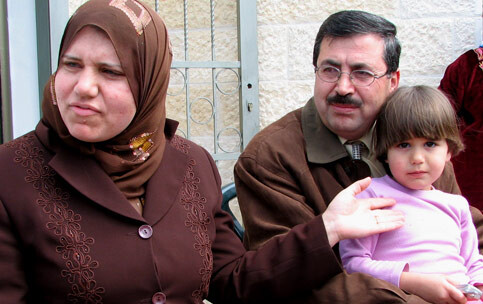
A family describes their experience being woken up and detained from 4am-10am with students from an An-Najah dormitory.
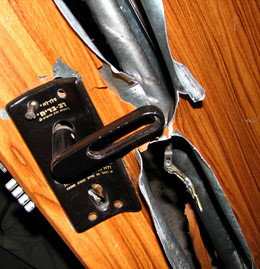
The door to a Al-Najaa dorm room after being destroyed by Israeli soldiers.
I apologize if these reports of detention, raids, human shields, and the obstruction of medical treatment seem repetitive. I tell them not only because I believe they each deserve to be heard, but more crucially because with enough reports the seemingly arbitrary harassment can no longer be dismissed as isolated incidents or simply unfortunate side effects of conflict, but must be recognized as unspoken policies of the Israeli Army. If the intention is security for Israeli citizens, these policies are not only ineffective but counter-productive in my opinion. If the intention is to scare the people of Nablus, then this is terrorism and should be recognized and condemned as such.
[… NEXT]
All images by Anna Baltzer
Anna Baltzer is a volunteer with the International Women’s Peace Service in the West Bank and author of the book, Witness in Palestine: Journal of a Jewish American Woman in the Occupied Territories. For information about her writing, photography, DVD, and speaking tours, visit her website at www.AnnaInTheMiddleEast.com.
Related Links




